
President Joe Biden’s decision to ease U.S. sanctions on Venezuela’s oil industry is complicating Democrats’ already uneasy relationship with the country’s expatriate community stateside.
By Washington Examiner – Naomi Lim
Dec 06, 2022
But as Biden contends with a precarious economy and weak consumer confidence, the move seems to concede defeat on whether Democrats can win back voters of Venezuelan descent, many of whom dislike the party’s embrace of socialism.
Biden’s decision to rescind former President Donald Trump’s 2019 sanctions so U.S. oil company Chevron Corporation can resume operations in Venezuela will exacerbate political difficulties for Democrats, such as Florida Reps. Debbie Wasserman Schultz (D), Kathy Castor (D), and Darren Soto (D), according to Republican strategist Cesar Conda, onetime chief of staff to Sen. Marco Rubio (R-FL).
“Any policy that could benefit the evil [Nicolás] Maduro regime will produce a backlash among Venezuelan Americans and Hispanics generally who escaped socialism in their home countries,” the founding partner of Republican consulting firm Navigators Global told the Washington Examiner. “The Americans want lower gas prices, but most believe we should produce more oil here in the U.S. instead of relying on foreign sources, especially from countries like Venezuela.”
Republican strategist John Feehery, an EFB Advocacy partner and former press secretary to then-House Speaker Dennis Hastert, added that “a wide swath of voters are wondering why the Biden administration has been so hard on domestic oil producers but so easy on oil state dictators” after the Treasury Department’s Office of Foreign Assets Control reauthorized Chevron’s joint ventures with the state-owned oil company Petroleos de Venezuela.
But Claremont McKenna College American politics professor John Pitney underscored how the states with the most Venezuelan Americans are Florida, Texas, New York, and California. Since the start of Venezuela’s political and humanitarian problems in 2014, the number in the United States has more than doubled from 216,000 to 465,000, making the demographic the country’s third-largest South American immigrant diaspora. That has served Republicans, including Florida Gov. Ron DeSantis (R), who became the first GOP governor in 40 years to win Miami-Dade County as part of his reelection last month, well.
“In presidential elections, these states are not in play,” Pitney, a former Republican strategist, said. “Florida and Texas are safely Republican, while New York and California are safely Democratic. So Biden can do whatever he wants about Venezuela without risking a single electoral vote.”
Simultaneously, Pitney emphasized how gas prices are a “major concern” for a “vast” majority of people. The national average gas price was $3.40 per gallon on Monday, according to AAA. That is roughly on par with averages from a year ago, before Russia’s invasion of Ukraine, a trend the White House has repeatedly stressed.
“If people doubt that expensive gas can bring down a president, they should have a word with Jimmy Carter,” Pitney said of the former president.
The White House has defended Biden’s decision, which does prevent Petroleos de Venezuela from receiving profits from Chevron-related oil sales. National Security Council spokesman John Kirby also disagreed that the move undermined Biden’s green economy transition.
“It has nothing to do with a benefit to the climate,” Kirby said during a press briefing. “There are 9,000 unused permits here in the United States on federal land that oil and gas companies can and should take advantage of. Nine thousand. And we’re talking about one there in Venezuela.”
“It remains to be seen how much will get drilled down there. It’ll be up to Chevron to decide that,” he went on. “But as a function of the sanction itself, that oil, whatever product is drilled, has to come to the United States.”
Regardless, Republicans have criticized Biden’s decision before Tuesday’s Senate runoff election in Georgia between Sen. Raphael Warnock (D-GA) and former NFL player Herschel Walker (R-GA). Warnock has an average 3.2 percentage point advantage and almost $20 million cash on hand edge, as of mid-November, according to poll aggregator RealClearPolitics and money tracker research group OpenSecrets.
“The Biden administration is astonishingly lifting sanctions on Venezuelan oil while Raphael Warnock helps Biden double down on their war on American energy,” Republican National Committee spokesman Tommy Pigott said. “Given his disdain for American energy, Warnock should be asked his opinion on Venezuelan oil.”
Policy-wise, Senate Foreign Relations Committee ranking member Jim Risch (R-ID) and top House Foreign Affairs Committee Republican Rep. Michael McCaul (R-TX) have also scrutinized Biden’s “alarming willingness” to “give in to the demands” of “a narco-terrorist regime,” which has “a history of using negotiations as a tactic for delaying meaningful action.”
“As we have said before, any change in U.S. policy toward Venezuela must be contingent on a transfer of power from the Maduro regime to a democratically-elected government,” Risch and McCaul wrote in a joint statement. “We are gravely concerned that this unilateral easing of sanctions will only perpetuate the crisis that Maduro has created for the Venezuelan people.”
…
Read More: Washington Examiner – Biden rolling back Venezuelan oil sanctions concedes Democratic outreach defeat
…

